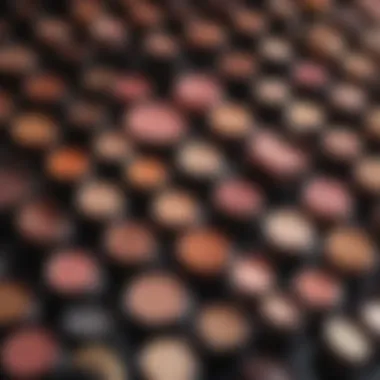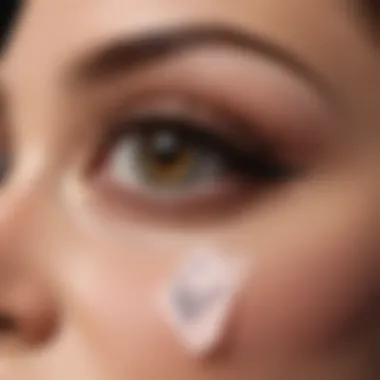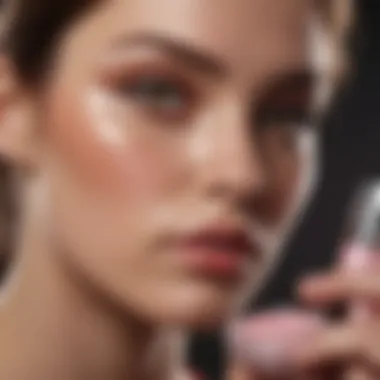Exploring the World of Paraben-Free Makeup


Intro
In recent years, the beauty industry has seen a significant shift towards more health-conscious products. Among these, paraben-free makeup has emerged as a popular choice. Parabens, commonly used preservatives in cosmetics, have faced scrutiny regarding their safety and potential health implications. This article explores the critical aspects of paraben-free makeup, including misconceptions about parabens, the benefits of choosing alternatives, and practical guidance on navigating the market. Readers will gain insights into how to make informed decisions about what they apply to their skin.
Fashion Trends
Fashion and beauty cannot be dissociated. As more consumers become aware of the ingredients in their makeup, styles evolve alongside these changes. This section covers how current fashion trends integrate paraben-free products into everyday beauty routines.
Seasonal Styles
With each season bringing new trends, the demand for safe and clean beauty products continues to rise. For example, fall collections may highlight deeper, richer colors, while spring often showcases lighter and more vibrant shades. Both seasonal styles are increasingly offered in paraben-free formulations. As a consumer, seeking out seasonal styles that embrace these alternatives allows for sophistication while prioritizing skin health.
Influencer Inspirations
Social media influencers have played a pivotal role in promoting paraben-free makeup. Many beauty bloggers and vloggers advocate for brands that prioritize clean beauty. Through tutorials and reviews, followers can witness the effectiveness and aesthetics of these products in real time. Consumers can draw inspiration from these platforms to discover looks that resonate with their personal style while supporting their health.
Beauty Tips
To best utilize paraben-free makeup, understanding proper techniques and routines is essential. Here, valuable beauty tips will help enhance results.
Skincare Routines
Before applying makeup, one must establish a solid skincare routine. A proper regimen should include:
- Cleansing your face daily to remove impurities
- Moisturizing with a paraben-free lotion to maintain hydration
- Keeping the skin protected using sunscreen
These features are vital for creating a smooth canvas for makeup application.
Makeup Techniques
When using paraben-free products, it is crucial to adapt techniques to maximize their effectiveness. For instance, using a primer specifically formulated without parabens can improve the longevity of foundation. Additionally, layering products in moderation will enhance overall appearance without overwhelming the skin.
Product Reviews
Product reviews offer a closer look at available paraben-free options, helping consumers make informed purchases. This section presents insights into popular products and brands.
Trending Products
Some widely-recommended paraben-free makeup options include Too Faced, Fenty Beauty, and BareMinerals. These brands typically offer a range of products from foundations to lipsticks, all free from parabens.
Comparison Guides
Understanding differences between products can aid in decision-making. For example, a comparison between Fenty Beauty’s Pro Filt’r Foundation and Too Faced’s Born This Way Foundation might demonstrate varying coverages and finishes, while both are paraben-free. Evaluating such aspects ensures a well-informed choice based upon individual skin type and preference.
Paraben-free makeup options have become more available, appealing to consumers concerned about skin health without sacrificing beauty.
Prelims to Parabens in Makeup
The use of parabens in cosmetics has sparked significant discussion and debate in recent years. Understanding parabens and their role in makeup is crucial for consumers who value health-conscious choices. Parabens are widely used preservatives that prevent the growth of harmful bacteria and mold in products. Their primary function is to extend the shelf life of cosmetics, which is especially important in an industry where product safety and longevity are paramount.
However, as awareness of skincare ingredients grows, many consumers express concern about the potential health implications of parabens. Informed decisions about makeup products can lead to better health outcomes, especially for individuals with sensitive skin or specific health concerns. This article will explore various aspects of parabens, including their definitions, historical context, health implications, and the rise of paraben-free alternatives.
Definition and Purpose of Parabens
Parabens are a group of synthetic compounds, primarily used as preservatives in cosmetics, personal care products, and some food items. Common types include methylparaben, ethylparaben, propylparaben, and butylparaben. Their main purpose is to inhibit microbial growth, thereby preventing product spoilage.


From lotions to shampoos, parabens help maintain the integrity of formulations, ensuring that users enjoy safe and effective products over time. The capability to efficiently combat spoilage has led to their widespread adoption in the cosmetic industry, where product longevity is critical. However, it is essential to weigh these benefits against emerging health concerns associated with their use.
History of Parabens in Cosmetics
The introduction of parabens into cosmetics dates back to the early 20th century. Their effectiveness as preservatives quickly established them as a standard ingredient in many beauty products. Over the decades, parabens became synonymous with product safety in the industry.
Despite their long history and acceptance, the early 2000s marked a turning point. Research began to uncover potential links between parabens and health issues, particularly regarding hormonal disruption. As a result, many consumers started to question the safety of parabens, leading to a growing demand for paraben-free products. This shift coincides with a broader trend toward clean beauty and greater transparency in ingredients. Understanding this history provides context for today's conversations surrounding parabens and their alternatives.
Health Concerns Linked to Parabens
The discourse on health concerns related to parabens is a crucial part of understanding the implications of using these preservatives in cosmetics. Parabens, often used to prevent the growth of bacteria and mold in beauty products, have raised significant attention due to their potential impacts on health. This section will explore two primary concerns: endocrine disruption and allergic reactions.
Endocrine Disruption and Hormonal Effects
Research suggests that parabens can mimic estrogen in the body, leading to endocrine disruption. This disruption may influence hormonal balance, which is essential for various biological functions. Studies have found traces of parabens in breast tumors, although it remains debatable if parabens directly contribute to cancer development.
Women, generally more exposed to these compounds due to their use of makeup, may experience varying effects. These could range from increased menstrual irregularities to fertility issues. Given the critical role hormones play, understanding how parabens interact with our biology is important. Choosing paraben-free options may mitigate risks, which is particularly relevant for young women and those trying to conceive.
Allergic Reactions and Skin Sensitivity
Allergic reactions to parabens are another concern that consumers should consider. Some individuals may experience dermatological issues such as redness, itching, or rashes upon using products containing parabens. Sensitive skin types are especially vulnerable.
Skin allergies can lead to frustration, prompting a search for alternatives. In many cases, switching to paraben-free makeup alleviates these symptoms, allowing users to enjoy their routine without discomfort.
"Understanding the ingredients in makeup is essential for making informed choices that support skin health and overall wellbeing."
The Rise of Paraben-Free Products
The demand for paraben-free makeup has grown significantly in recent years. This can be attributed to a shift in consumer awareness and prioritization of health and well-being in beauty choices. Parabens, widely used as preservatives in cosmetics, have come under scrutiny due to potential health risks. As a result, consumers began seeking alternative products that forgo these controversial chemicals. This section explores how market trends and regulatory responses together shape the landscape of paraben-free makeup.
Market Trends and Consumer Demand
Market trends indicate a significant surge in the popularity of paraben-free products. Consumers are speaking out against ingredients they perceive as harmful. Surveys show that a large segment of the population is willing to pay more for products free from parabens and other harmful ingredients. This demand reflects a growing consciousness about personal health and environmental issues.
Moreover, there is an increasing preference for natural and organic cosmetics. Brands are responding by reformulating their products. In the past few years, retailers have expanded their offerings of paraben-free options to meet consumer expectations. Large and small companies alike are developing product lines that emphasize clean beauty.
"The clean beauty movement is not just a trend, but a lasting shift in how we approach personal care products."
An emerging trend is transparency in the beauty industry. Brands are not only removing parabens from their formulations but also actively communicating with consumers about what goes into their products. This type of accountability builds trust between consumers and manufacturers, fostering loyalty and encouraging informed choices.
Regulatory Response and Industry Standards
The rise in consumer demand for paraben-free products has prompted various regulatory bodies to take action. Agencies such as the FDA and the European Commission have been evaluating the safety of parabens in cosmetics. While parabens are still regarded as safe at certain concentrations, these evaluations have led some countries to impose restrictions or bans on specific types of parabens.
In response, many companies adopt stricter industry standards. Some brands voluntarily choose to remove all parabens from their products, regardless of regulatory guidelines. This proactive approach not only meets consumer demand but also positions brands as leaders in the burgeoning clean beauty market.
Furthermore, beauty certifications and seals are becoming more prevalent. Brands that adhere to certain standards can earn recognition, helping consumers identify trustworthy products. As such industry frameworks solidify, the landscape around paraben-free makeup will likely continue to evolve, providing consumers with safer and more responsible options.
In summary, the rise of paraben-free products highlights a significant shift in consumer expectations and industry practices. It presents an opportunity for brands to innovate and cater to a growing market that demands safety, transparency, and responsibility in their beauty routines.
Identifying Paraben-Free Makeup
Identifying paraben-free makeup is crucial in today’s beauty landscape. As consumers grow more aware of what is on their skin, the ability to distinguish between products with and without parabens becomes vital. Paraben-free makeup often appeals to those looking to minimize skin irritation and reduce exposure to potential chemicals linked to health issues.
Parabens are widely recognized preservatives used in cosmetics. They help extend shelf life but may not be suitable for everyone. So, knowing how to identify paraben-free products is key for safer skincare.


Understanding what to look for on product labels is part of this process. By becoming well-versed in label reading, consumers can confidently choose products that align with their health and ethical concerns.
Beyond recognizing labels, it is essential to be aware of common ingredients that may indicate the presence of parabens or other harmful substances. This knowledge empowers consumers to make informed decisions that reflect their values and personal care standards.
Understanding Product Labels
When reading product labels, clarity is paramount. Most products are required to display ingredient lists clearly. Look for the word "paraben" or specific types such as methylparaben, ethylparaben, butylparaben, or propylparaben on the label. If these terms are absent, the product may be considered paraben-free.
Here are some tips to enhance your label-reading skills:
- Check ingredient lists for parabens. They are typically listed toward the end of the ingredients, so a thorough read is necessary.
- Watch for brands that emphasize paraben-free on their packaging. Some companies go as far as to highlight this feature prominently.
- Consult online resources or mobile apps. Several platforms simplify the search for paraben-free products and educate consumers about their choices.
"Empowering consumers through education about product ingredients is essential in promoting healthier beauty choices."
Common Ingredients to Avoid
Aside from parabens, other substances can contribute to skin reactions or health concerns. Familiarizing yourself with these ingredients can further guide your purchasing decisions. Here are some to keep in mind:
- Synthetic fragrances: Often a blend of different chemicals, they can cause allergic reactions.
- Sulfates: These can irritate the skin and strip away moisture.
- Phthalates: Commonly used to make products more pliable, they may affect hormone levels.
- Formaldehyde: A known irritant and potential carcinogen, found in some hair products.
Being proactive in recognizing these ingredients promotes a healthier approach to beauty. Ultimately, choosing paraben-free options can support skin health and align with a more conscious lifestyle.
Benefits of Choosing Paraben-Free Makeup
The conversation around makeup is evolving. Opting for paraben-free products is becoming increasingly significant among consumers who care about their health and the environment. Understanding the benefits of choosing these formulations is essential, especially for those who may have skin sensitivities or who are concerned about long-term health implications. Paraben-free makeup options generally offer cleaner compositions that steer clear of synthetic preservatives, which have faced scrutiny in recent years.
Gentler Formulations for Sensitive Skin
One of the main advantages of paraben-free makeup is the formulation. Parabens can be harsh, especially for individuals with sensitive skin or allergies. Many paraben-free products use gentler, plant-based additives that nurture the skin rather than potentially irritating it. Ingredients such as aloe vera and chamomile are common in these formulations, offering soothing effects. If you find that traditional cosmetics often lead to rashes or redness, paraben-free alternatives may provide a more comfortable experience.
Many brands are now adopting this approach, creating lines that prioritize skin health. Here are some reasons to consider a gentler formulation:
- Fewer irritants: With natural ingredients, the risk of allergic reactions decreases.
- Hydration: Gentle formulas often contain hydrating agents that soothe the skin.
- Balance: Many paraben-free options help maintain the skin's natural balance without disrupting its pH levels.
"Choosing gentler formulations can transform the way you feel about your daily makeup routine."
Environmental Considerations
The choice for paraben-free makeup spans beyond immediate health benefits. Environmental concerns are also at play. Many paraben-free brands commit to more sustainable practices, minimizing environmental impacts. Traditional production methods can lead to chemical runoff that affects ecosystems and water sources. In contrast, brands focused on clean beauty often utilize ethically sourced ingredients and environmentally friendly packaging.
Additionally, the demand for paraben-free products has led to a rise in brands that prioritize sustainability at every stage of production, from ingredient sourcing to packaging. This means more biodegradable or recyclable packaging and less pollution. Choosing paraben-free is, in essence, choosing a greener path for beauty, which resonates with a growing eco-conscious audience. Consider the following when evaluating the environmental impact:
- Sourcing: Look for brands that source ingredients responsibly.
- Packaging: Evaluate if the packaging is recyclable or biodegradable.
- Transparency: Favor brands that disclose their practices and ingredient origins.
Recommended Paraben-Free Makeup Brands
Choosing the right makeup brand can greatly influence not only your skin health but also your overall beauty routine. In recent years, the demand for paraben-free makeup has risen significantly, prompting both emerging and established brands to adapt their formulations. This section highlights notable paraben-free makeup brands, categorizing them into emerging ones that offer fresh and innovative products, and established brands that are well-known for their commitment to clean beauty practices.
Emerging Brands to Consider
Emerging brands often bring unique perspectives and groundbreaking formulations to the market. They frequently emphasize natural ingredients while avoiding parabens, synthetic fragrances, and other potentially harmful components. This is significant not just for product safety but also for innovation in the beauty industry.
Some notable emerging brands include:
- Ilia Beauty: Known for its clean and high-performance cosmetics, Ilia runs an enticing range that highlights natural beauty without using parabens.
- EcoTools: While primarily known for their makeup brushes, EcoTools also offers makeup products that are paraben-free and eco-conscious.
- 100% Pure: This brand prides itself on offering pure, natural makeup products free of harmful additives, catering to health-conscious consumers.
When selecting emerging brands, it is crucial to consider their ingredient sourcing practices, ethical production methods, and customer reviews to ensure the best experience. New brands can offer cutting-edge solutions that traditional companies may overlook.


Established Brands with Clean Lines
In contrast to newer brands, established companies tend to have a legacy of quality and reliability. Many of these brands have made significant strides to reformulate their products, ensuring that they meet consumer demand for paraben-free options.
Some recognized brands that provide reliable paraben-free makeup include:
- BareMinerals: A leader in mineral-based makeup, BareMinerals has been an advocate for cleaner beauty formulations for years and continues to innovate their product lines without parabens.
- Tarte Cosmetics: Tarte stands out for its commitment to using natural ingredients while guaranteeing that its makeup does not include toxic substances like parabens.
- Too Faced: Known for vibrant colors and creative packaging, Too Faced also focuses on maintaining a clean and cruelty-free product line.
- Clinique: Clinique is famous for its dermatologist-developed products. Many of its makeup offerings are paraben-free, aligning with its long-standing ethos of skin wellness.
Investing in reputable brands that prioritize paraben-free formulations is crucial for consumers who are concerned about skin health and environmental impact.
By opting for these brands, consumers contribute to a growing industry trend that prioritizes health and sustainability, reflecting a more informed choice in beauty routines.
Consumer Responsibility in the Beauty Industry
Consumer responsibility in the beauty industry is a pivotal concept that affects not only individual choices but also the broader marketplace. With an increased awareness of health and environmental concerns, consumers are now more empowered than ever to demand products that align with their values. Choosing paraben-free makeup is a significant aspect of this responsibility. By making informed decisions, consumers can influence manufacturers to prioritize cleaner, safer ingredients.
The beauty industry has historically used a wide array of chemicals, some of which may be harmful to health. Parabens, commonly used as preservatives, exemplify this concern. As consumers become more aware of potential health issues related to such ingredients, it is crucial to engage in thoughtful discussions about product safety and efficacy.
Furthermore, transparency is an essential component of consumer responsibility. As individuals, supporting brands that openly disclose their ingredients and manufacturing practices can foster an environment where accountability flourishes. Choosing brands that advocate for paraben-free products showcases a preference for health-conscious formulations, thus urging more companies to shift their focus toward cleaner alternatives.
Educating Oneself and Others
Education plays a fundamental role in practicing responsible consumerism. By arming oneself with knowledge about the ingredients present in makeup products, consumers can discern what is suitable for their needs. This knowledge also enables individuals to communicate effectively with their peers. For instance, sharing insights about the risks associated with parabens and the benefits of paraben-free options can encourage friends and family to reconsider their beauty choices.
It is beneficial to explore various resources to stay informed. Websites such as Wikipedia and Britannica provide accessible information regarding cosmetic ingredients and their effects. Engaging in discussions on platforms like Reddit allows for the exchange of personal experiences and recommendations, thereby fostering a community focused on informed decision-making.
"The first step towards change is awareness. The second step is acceptance."
Supporting Sustainable Practices
Supporting sustainable practices not only benefits the environment but also cultivates a sense of community responsibility. Many paraben-free brands are committed to eco-friendly practices, often utilizing sustainable packaging and ethical sourcing of ingredients. By endorsing such brands, consumers help create a market that values environmental considerations.
Practicing sustainability can take various forms, including:
- Choosing brands with refillable packaging: This minimizes waste and promotes a circular economy.
- Opting for locally sourced ingredients: Supporting local suppliers reduces carbon footprints and supports local economies.
- Participating in recycling initiatives: Many brands encourage consumers to return empty containers for recycling, thereby contributing to waste reduction.
As consumers become advocates for paraben-free makeup, their choices can drive larger industry shifts toward sustainability. Engaging with companies that prioritize environmental well-being can enhance innovation and sustainability in product formulations.
By prioritizing education and sustainability, individuals make significant contributions to a healthier beauty industry. Such efforts not only shape personal beauty routines but also cultivate a more responsible consumer landscape.
Epilogue: Making Informed Choices
In today’s beauty market, the concept of making informed choices regarding makeup products has become increasingly important. As consumers become more aware of the ingredients in their cosmetics, the demand for paraben-free options continues to rise. Parabens, once regarded as safe preservatives, have drawn scrutiny due to their potential health effects. Understanding these impacts allows individuals to avoid potential risks associated with their beauty routines.
Choosing paraben-free makeup is not just a trend; it reflects a commitment to health and wellness. By selecting products that do not contain these preservatives, users can mitigate concerns about endocrine disruption and skin irritation. This conscious choice can encourage brands to prioritize safer formulations and ethical practices. Moreover, being deliberate about product selection enhances the overall beauty experience, ensuring that individuals feel good both inside and out.
Summarizing Key Points
As the article has illustrated, several key points are essential for comprehending the significance of paraben-free makeup:
- Health Risks: Research indicates that parabens may disrupt hormones and could lead to allergic reactions.
- Market Shift: Consumers increasingly seek paraben-free products, prompting brands to reformulate and embrace transparency.
- Ingredient Literacy: Understanding labels and recognizing harmful ingredients empower consumers to make better choices.
- Benefits of Paraben-Free: These products often offer gentler formulas, making them suitable for sensitive skin.
- Sustainable Practices: Choosing brands that prioritize clean ingredients reflects a commitment to environmental health.
Encouraging a Conscious Beauty Routine
Encouraging a conscious beauty routine involves actively considering the implications of product choices. Here are some strategies for establishing such a routine:
- Research Brands: Familiarize yourself with brands that are recognized for their commitment to safe and effective formulations. Look for those that transparently disclose all ingredients.
- Read Labels: Develop the habit of scrutinizing product labels. Many makeup items are marketed as “free from parabens,” yet still contain questionable chemicals.
- Experiment with Natural Alternatives: Sometimes, the best products can be found in natural alternatives that prioritize skin safety.
- Advocate for Change: Supporting brands that use sustainable practices encourages the beauty industry to evolve towards safer formulations.
- Share Knowledge: Engaging in conversations with friends and family about the importance of paraben-free makeup raises awareness and promotes shared learning.
"Knowledge is empowerment; understanding what we use on our bodies can redefine our beauty experience and health."
By following these guidelines and staying vigilant about product choices, consumers can foster a more thoughtful approach to beauty that aligns with their values, ultimately leading to healthier skin and a more sustainable planet.



